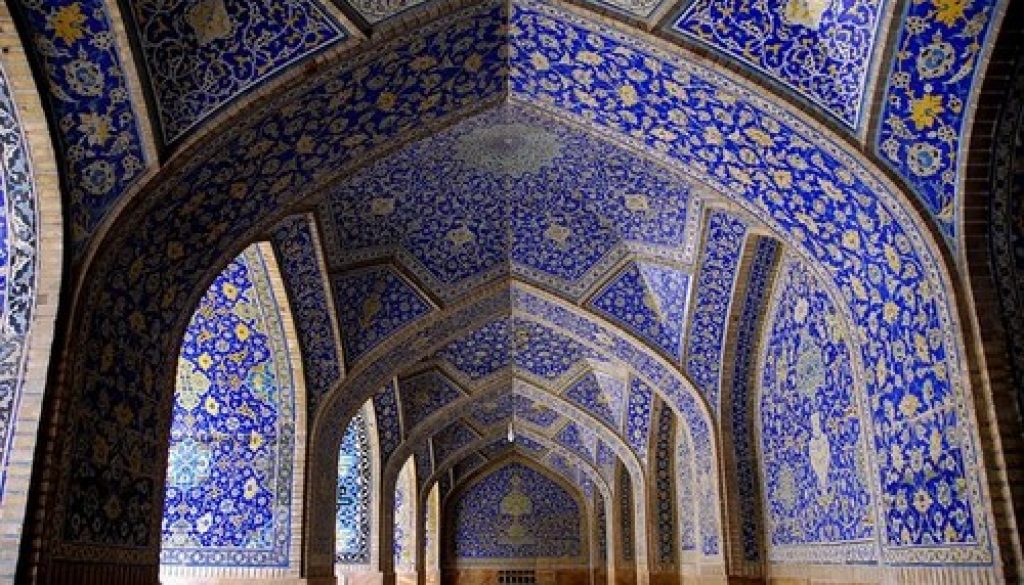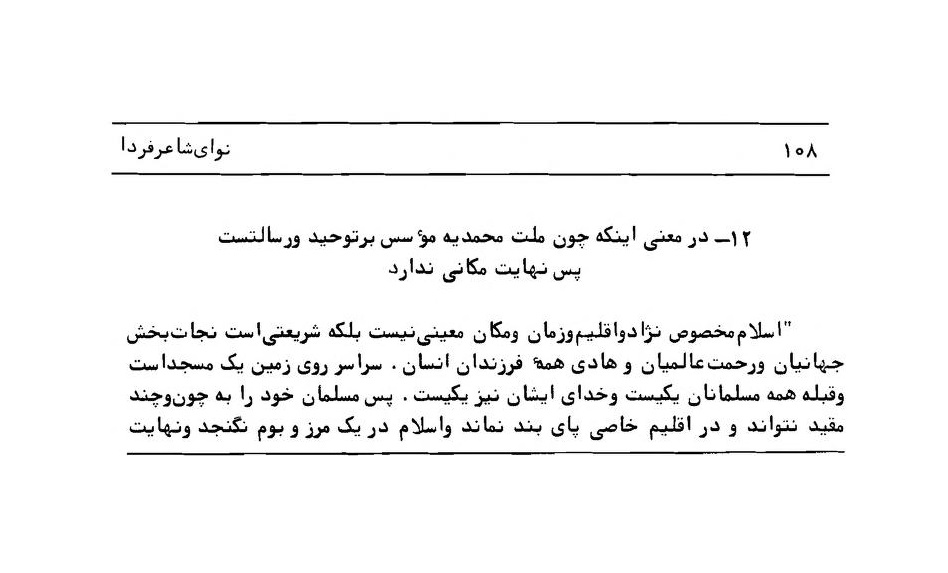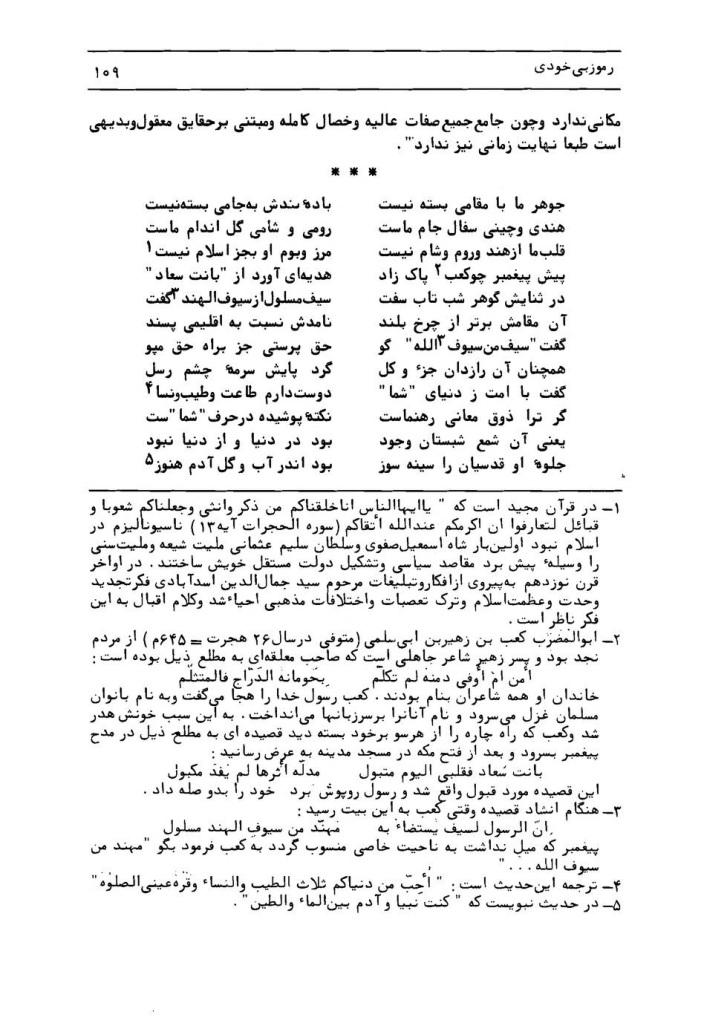*
رموز بی خودی
*
That since the Muhammadan Community is Founded
upon Belief in One God and Apostleship, therefore it
is not Bounded by Space
&
Our Essence is not bound to any Place;
The vigour of our wine is not contained
In any bowl; Chinese and Indian
Alike the sherd that constitutes our jar,
Turkish and Syrian alike the clay
Forming our body; neither is our heart
Of India, or Syria, or Rum,
Nor any fatherland do we profess
Except Islam. When pure-descended Kaab [58]
Brought to the Prophet for an offering
His famed -Banat Su’ad-, whereon he strung
The night-illuming jewels of his praise,
And there addressed him as -an unsheathed sword
Of India-, it did not please his heart
(Being sublimer than high heaven’s sphere)
To be attributed to any clime;
And so the Prophet answered, “Rather say
-A sword of God-; if Truth thou worshippest,
No other pathway travel but of Truth.”
Full well he knew the mystery of Part
And Whole, the very dust beneath his feet
Being the magical collyrium
Laid on the eyes of all God’s messengers;
And so he spoke to his Community,
“-Of all this world of yours, I love alone [59]
Obedient hearts, sweet perfumes, women chaste-.”
If the perception of realities
Guideth thy steps, the subtlety confined
In that word -yours- will not be hid from thee.
Indeed, that lantern of all Being’s night
Dwelt in the world, but was not of the world;
His splendour, that consumed the adoring breasts
Of holy angels, shone -while Adam yet [60]
Was clay and water-. Of what land he was
I know not; this much only I do know,
He is our comrade. These base elements
He reckoned for -our- world, himself our guest.
We, who have lost the souls within our breasts,
Have therefore lost ourselves in this mean dust.
Thou art a Muslim; do not bind thy heart
To any clime, nor lose thyself within
This world dimensionate. The Muslim true
Is not contained in any land on earth;
Syria and Rum are lost within his heart.
Grasp thou the heart, and in its vast expanse
Lose this mirage of water and of clay.
Our Master, fleeing from his fatherland,
Resolved the knot of Muslim nationhood.
His wisdom founded one Community –
The world its parish – on the sacred charge
To civilize; that Ruler of our faith
Of his abundant bounty gave the earth
Entire to be the confines of our mosque.
He, whom God eulogized in the Koran
And promised He would -save his soul alive-, [61]
Struck hapless awe into his enemies
So that they trembled at his majesty.
Why fled he, then, from his ancestral home? [62]
Supposest thou he ran before his foes?
The chroniclers, ill understanding what
The Flight portends, have hid the truth from us.
Flight is the law that rules the Muslim’s life,
And is a cause of his stability;
Its meaning is, to leap from shallowness,
To quit the dew, the ocean to subdue.
Transgress the bloom; the garden is thy goal;
The loss of less more vastly gain adorns.
The sun’s great glory is in ranging free;
The skies’ arena lies beneath his feet.
Be not a streamlet, seeking wealth from rain;
Be boundless; quest no limit in the world.
The frowning sea was once a simple plain,
Played being shore, and liquefied of shame.
Have thou the will to master everything,
That thou mayest win dominion over all;
Plunge like a fish, and populate the sea;
Shake off the chains of too constricted space.
He who has burst from all dimensions’ bonds
Ranges through all directions, like the sky.
The rose’s scent by parting from the rose
Leaps far abroad, and through the garden’s breadth
Disseminates itself. Thou, who hast snatched
One corner of the meadow for thine own,
Like the poor nightingale art satisfied
To serenade one rose. Be like the breeze;
Cast off the burden of complacency
From thy broad shoulders; in thy wide embrace
Gather the garden. Be thou wary; lo,
These times are full of treachery, the way
Beset by brigands; wayfarer, beware!
*
That the Country is not the Foundation of
the Community
&
Now Brotherhood has been so cut to shreds
That in the stead of the Community
The Country has been given pride of place
In men’s allegiance and constructive work;
The Country is the darling of their hearts,
And wide Humanity is whittled down
Into dismembered tribes. Men thought to find
Paradise in -that miserable abode [63]
Of ruin where they made the peoples dwell-.
This tree has banished heaven from the world
And borne for fruit the bitterness of war;
Humanity is but a legend, man
Become a stranger to his fellow-man.
The spirit has departed from the flesh,
Only the seven disjointed limbs remain;
Vanished is humankind; there but abide
The disunited nations. Politics
Dethroned religion; this tree first struck root
Within a Western garden, and the tale
Of Christianity was all rolled up,
The radiance of the Churches’ lantern dimmed;
Pope powerless and baffled, from his land
The counters scattered; Jesus’ followers
Spurning the Church; debased the coinage
Of the True Cross’s law. When atheism
First rent religion’s garment, there arrived
That Satan’s messenger, the Florentine [64]
Who worshipped falsehood, whose collyrium
Shattered the sight of men. He wrote a scroll
For Princes, and so scattered in our clay
The seed of conflict; his fell genius
Decamped to darkness, and his swordlike pen
Struck Truth asunder. Carving images
Like Azar was his trade; his fertile mind [65]
Conceived a new design; his novel faith
Proclaimed the State the only worshipful;
His thoughts the ignoble turned to praiseworthy.
So, when the feet of this adorable
He kissed, the touchstone that he introduced
To test the truth was Gain. His doctrine caused
Falsehood to flourish; plotting stratagems
Became an art. A sad and sorry end
Attended the regime which he devised,
That calthrop which he scattered on the road
Of the advancing days. Dark night he wrapped
About the peoples’ eyes; deception called,
In his vocabulary, expediency.
*
Legendă:
[58] Kaab, poet din epoca lui Muhammad ﷺ, devine musulman deși refuză inițial să accepte islamul; scrie panegiricul Banat Su’ad în onoarea Profetului ﷺ.
[59] este parafrazată o relatare a Profetului ﷺ.
[60] citează o spusă profetică; Muhammad ﷺ a fost ales Profet când „Adam era (creat) între apă și lut”.
[61] Māida, 17: Cei care spun: Allah este Cristos, fiul Mariei, nu au crezut. Spune: Cine s-ar putea împotrivi lui Allah dacă ar vrea să-l nimicească pe Cristos, fiul Mariei, pe mama sa precum și pe toţi cei de pe pământ? A lui Allah este împărăţia cerurilor şi a pământului şi ceea ce se află între acestea. El creează ceea ce voieşte. Allah asupra tuturor are putere.
[62] Iqbal evocă „fuga” lui Muhammad din Mecca la Medina în anul 622.
[63] Ibrahīm, 33-4: El v-a supus vouă soarele şi luna ce sunt fără odihnă. El v-a supus vouă noaptea şi ziua. El v-a dăruit tot ce i-aţi cerut. Dacă aţi vrea să număraţi binefacerile lui Allah, nu le-aţi putea socoti. Omul este nedrept şi nemulţumitor.
[64] se referă la Machiavelli.
[65] Azar, tatăl lui Avraam, era idolatru; Anām, 74: Aminteşte-ţi de Avraam când spuse tatălui său, Azar: Tu iei idoli drept zei? Te văd, pe tine şi poporul tău, într-o rătăcire vădită.
*
Stray thoughts Reflections
*
AURANGZEB
The political genius of Aurangzeb was extremely comprehensive. His one aim of life was, as it were, to subsume the various communities of this country under the notion of one universal empire. But in securing this imperial unity he erroneously listened to the dictates of his indomitable courage which had no sufficient background of political experience behind it. Ignoring the factor of time in the political evolution of his contemplated empire he started an endless struggle in the hope that he would be able to unify the discordant political units of India in his own life-time. He failed to Islamise (not in the religious sense) India just as Alexander had failed to Hellenise Asia. The Englishman, however, came fully equipped with the political experiences of the nations of antiquity – and his patience and tortoise-like perseverance succeeded where the hasty genius of Aurangzeb had failed. Conquest does not necessarily mean unity. Moreover, the history of the preceding Muslim dynasties had taught Aurangzeb that the strength of Islam in India did not depend, as his great ancestor Akbar had thought, so much on the goodwill of the people of this land as on the strength of the ruling race. With all his keen political perception, however, he could not undo the doings of his forefathers. Sevajee was not a product of Aurangzeb’s reign; the Maharatta owed his existence to social and political forces called into being by the policy of Akbar. Aurangzeb’s political perception, though true, was too late. Yet considering the significance of this perception he must be looked upon as the founder of Musalman nationality in India. I am sure posterity will one day recognise the truth of what I say. Among the English administrators of India, it was Lord Curzon who first perceived the truth about the power of England in India. Hindu nationalism is wrongly attributed to his policy. Time will, I believe, show that it owes its existence to the policy of Lord Ripon. It is, therefore, clear that in their political purpose and perception both the Mughals and the English agree. I see no reason why the English historian should condemn Aurangzeb whose imperial ideal his countrymen have followed and whose political perception they have corroborated. Aurangzeb’s political method was certainly very rough; but the ethical worth of his method ought to be judged from the standpoint of the age in which he lived and worked.
&
THE CONQUEST OF PERSIA
If you ask me what is the most important event in the history of Islam, I shall say without any hesitation: “The Conquest of Persia.” The battle of Nehawand gave the Arabs not only a beautiful country, but also an ancient civilisation; or, more properly, a people who could make a new civilisation with the Semitic and Aryan material. Our Muslim civilisation is a product of the cross-fertilisation of the Semitic and the Aryan ideas. It is a child who inherits the softness and refinement of his Aryan mother, and the sterling character of his Semitic father. But for the conquest of Persia, the civilisation of Islam would have been one-sided. The conquest of Persia gave us what the conquest of Greece gave to the Romans.
&
GHALIB
As far as I can see Mirza Ghalib – the Persian poet – is probably the only permanent contribution that we – Indian Muslims – have made to the general Muslim literature. Indeed he is one of those poets whose imagination and intellect place them above the narrow limitations of creed and nationality. His recognition is yet to come.
&
THE TUTELAGE OF NATIONS
A disinterested foreign rule is an impossibility. Yet the tutelage of nations is a necessity. The fee paid for this tuition is sometimes a nation’s daily bread. The Mexicans had to undergo a severe training under the Spaniards before they could undertake to manage their own affairs.
&
THE POPULARITY OF A POEM
The popularity of a poem does not depend on the amount of logical truth revealed in it. Goldsmith’s “Deserted Village” is extremely popular; yet the poem is full of scientific inaccuracies and bad economic reasoning.
&
HEGEL, GOETHE, GHALIB, BEDIL AND WORDSWORTH
I confess I owe a great deal to Hegel, Goethe, Mirza Ghalib, Mirza Abdul Qadir Bedil and Wordsworth. The first two led me into the “inside” of things; the third and fourth taught me how to remain oriental in spirit and expression after having assimilated foreign ideals of poetry, and the last saved me from atheism in my student dats.
&
PARABLES
To explain the deepest truths of life in the form of homely parables requires extraordinary genius. Shakespeare, Maulana Rum (Jalaluddin) and Jesus Christ are probably the only illustrations of this rare type of genius.
&
THE JEWISH CONTRIBUTION TO CIVILISATION
In the development of universal civilisation the Jewish factor cannot be regarded as negligible quantity. The Jews were probably the first framers of the principles of business morality summed up in the idea of righteousness.
&
MAZZINI
The true sphere of Mazzini was literature, not politics. The gain of Italy is not much compared to the loss which the world has suffered by his devotion to politics.
&
THE DEPENDENCE OF SCIENCE ON METAPHYSICS
Modern science ought not to mock at metaphysics, for it was a metaphyisician – Liebnitz – who first gave science her working idea of matter. The “substance,” said he, is essentially “force,” “resistance.” Borrowing this notion from metaphysics, science devotes herself to the study of the behaviour of this force. And it is clear that she could not have discovered it for herself.









